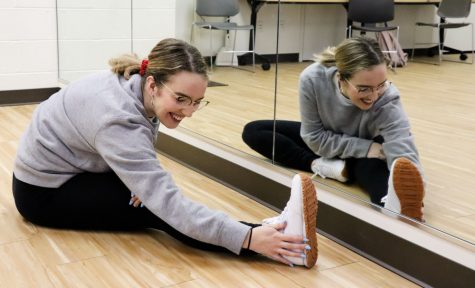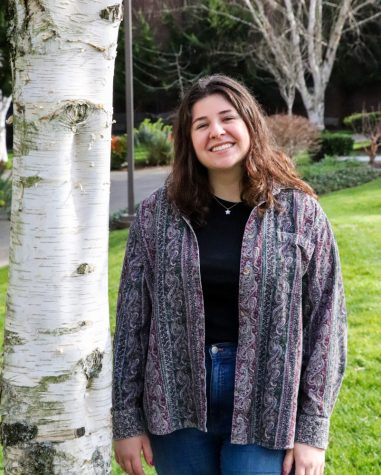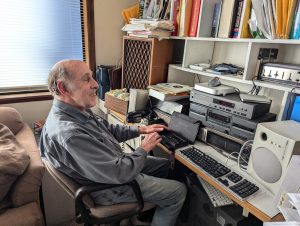How students take time to destress during finals
Students advocate techniques to manage stress with impending finals anxiety
March 5, 2020

Quinn Laulainen of Ante Up combats her stress by dancing.
Allison O’Connor remembered sitting on the grass in Gas Works Park last spring. She sat in the warm sun and looked out across the water. She switched between reading a book and writing in her journal. She focused on sitting with nothing else but her thoughts.
Last year, O’Connor, who is currently a senior majoring in sociology with a double minor in women’s studies and reconciliation studies, had to make a decision over spring break about taking the position of lead RA and journaling helped her think through it.
“I journaled a lot that week about what I was thinking and feeling. It was really helpful to take a seemingly really big problem and make it a bit more tangible,” O’Connor said.
People use different strategies to destress and scheduling time to destress can be beneficial.
Similarly to O’Connor, Quinn Laulainen, a sophomore majoring in human development and family studies, and Alysse Mastromarino, a junior majoring in urban sociology and Spanish, also say that they have to schedule time in their days to pause and focus on themselves. Laulainen likes dancing and Mastromarino enjoys getting off campus and going outside.
O’Connor began journaling as a way to cope with stress when she started college. Although she has always enjoyed journaling, this technique was recommended by her counselor in high school as a way to destress. She said that journaling is a way for her to sit down and unload mentally.
“I think the act of putting what I’m feeling on paper helps take the power away from it … when it’s on paper I can see everything that I’m concerned or stressed about,” O’Connor said.
Keely Swan, who worked as a Mental Health Counselor at Western Oregon University, and currently works as a Behavioral Health Counselor for the Philomath School District said that exercise is another thing that is beneficial for students during finals week.
“When finals are coming up, make sure you are physically doing something to get active … to get a lot of those stress hormones out of your body,” Swan said.
When Laulainen gets stressed, she likes to get active and expresses her positive and negative emotions through dance.
“In general, [dance] helps me process. It’s just the way that I like to show emotion and creativity,” Laulainen said.

Alysse Mastromarino, a junior at SPU, combats stress by taking long walks outside and enjoying nature.
Laulainen also said that scheduling out her days leading up to finals is crucial to avoiding stress.
“At least for me, what’s helpful is planning ahead. Reserve those library rooms now, plan out your study times and also plan out time to rest,” Laulainen said.
If she cannot make it to a dance class, Laulainen will often walk along the canal, particularly when the weather gets warmer. She said that she reminds herself that she deserves a break sometimes.
Mastromarino also likes to spend time outside when she needs to destress. Mastromarino grew up in Santa Barbara, California and spent a lot of time outside, especially at the beach. She likes to go outside as a way to take a break from school work.
Mastromarino said getting outside and off school grounds allows her time to pause. Her favorite place to get off campus is Golden Gardens Park, but she said that walking along the canal or hanging out at Gas Works Park is a great alternative.
“Especially if I don’t bring my school work with me, then I’m forced to take a break,” Mastromarino said.
Mastromarino is a Student Ministry Coordinator, a job that has allowed her to help students who may be dealing with stress or need help talking over tough issues. She said she reminds students to give themselves grace and peace when they are going through a rough time and to not be afraid to talk with their SMCs.
Students can schedule time to talk with their SMCs about any stress that they may be experiencing, but they can also visit the Student Counseling Center on campus.
Swan said students should take care of themselves and use the resources they have. She explained that counseling on campus is a great resource, especially if students are going beyond a productive level of stress.
Both O’Connor and Laulainen used counseling to help them cope with stress and other issues they are facing.
“It took me so long last year to go and actually ask for help … even if it’s just the littlest things it’s better to get the help than not have it,” Laulainen said.
In the weeks leading up to finals, students can take time to destress in the ways that are most beneficial to them. Planning is key to fitting time for self-care into students’ schedules.
“When you’re stressed there’s so much power in just naming it, whether it’s on paper, or with a person, or through an instrument, or through any other activity like a sport,” O’Connor said.

























































































